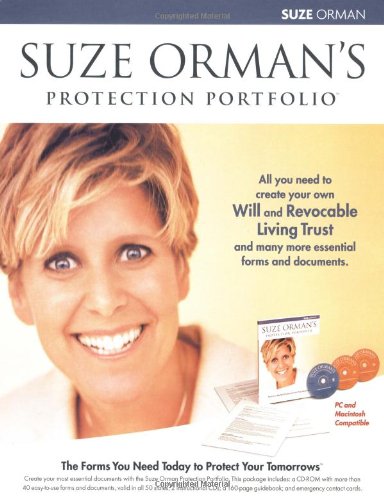You've agreed to be the executor of a person's estate. You've never been an executor before. That person has now gone on to their eternal reward. Now the person can be called "the decedent."
What should you be doing now that the distribution of the estate is in your hands?
Financial Power Of Attorney
1. Go visit your assurance agent and buy an Errors and Omissions Liability policy. This covers you for your work as an executor or trustee. Don't be a fool and be an executor without this coverage.
Suze Orman's Protection Portfolio: Will & Trust Kit. The Forms You Need Today to Protect Your Tomorrows Best
Rate This Product :

Suze Orman's Protection Portfolio: Will & Trust Kit. The Forms You Need Today to Protect Your Tomorrows Feature
- gret to get organized!
Suze Orman's Protection Portfolio: Will & Trust Kit. The Forms You Need Today to Protect Your Tomorrows Overview
Suze Orman's Financial Package is a systematic approach for organising your essential documents. The Financial Package is very different from any other product of this type, because Suze has included three CDs that actually include the forms and instructions to create your own advanced directive with durable power of attorney for health care, financial power of attorney, will, and a trust.Customer Reviews
*** Product Information and Prices Stored: Jan 14, 2012 19:35:55
2. Get the properly executed copy of the decedent's Last Will and Testament. It may be effortlessly ready through relatives, the decedent's attorney or a bank safe deposit box. But, you might have to carefully hunt through the decedent's home to find it. If the bank safe deposit box has been sealed, you may have to get a court order to open it.
3. File the Will with Probate Court. Each state has laws that state the time requirements for filing a will after the death of the testator. Ordinarily it is 30 days, but find out your state's law.
4. hunt the decedent's home for foremost documents, assurance policies and valuables. Citizen are paramount for hiding these types of things, so you may find them in the attic, the cellar, between mattresses, in shoes, stashed in dresser drawers, in safes or other creative hiding places. These days, you will want to uncover financial records, together with computer passwords and Pins.
5. If you have some of the estate's money, open an estate checking account. Only use it for estate business. Pay the mortgage, utilities, etc., from this account.
6. Put in order a file box or file cabinet drawer into which will go all the paperwork for the estate. Set up a ledger book or diary, and keep very definite records of everything you do. Make your entries daily...don't rely on your memory.
7. If the decedent's house is not empty, it no longer qualifies for a homeowner policy. Call the assurance agent and have the policy changed to a Dwelling Fire policy. This is crucial, since the assurance enterprise could deny coverage on a vacant home under a homeowner policy. Also place the policy in the name of the estate.
8. Turn the locks on the house.
9. If the house is going to be sold, perceive a realtor and begin preparing the house for sale. If you have to incur expenses for improvements or cleanup, the expenses can offset any capital gains from the sale.
10. Begin to work out the disposition of the personal asset with the heirs. To safe yourself as the executor, reconsider recording all conversations you have with whatever while you work as executor. Also, reconsider manufacture detailed inventories of personal property, and need heirs to sign off on all asset when they take rights of it.
11. Stay in perceive with your probate attorney. The estate can pay his fees, but you must be sure that what you're doing is within the law. Ignorance is no excuse.
There! That should get you started in your capacity as Executor. Best of luck as you accomplish a considerable but sometimes thankless job.
Estate Executor - 11 Tips on What Do I Do First"EFF Confidential!" Video Clips. Duration : 57.13 Mins.Google TechTalks February 9, 2006 Danny O'Brien and Jason Schultz Danny O'Brien Danny O'Brien is the Activism Coordinator for the EFF. His job is to help EFF's membership in making their voice heard: in government and regulatory circles, in the marketplace, and with the wider public. Jason Schultz Jason Schultz is a Staff Attorney specializing in intellectual property and reverse engineering. He currently leads EFF's Patent Busting Project. Prior to joining EFF, Schultz worked at the law firm of Fish & Richardson PC, where he spent most of his time invalidating software patents and defending open source developers in law suits. Jason maintains a personal blog at...
Tags: google, howto, eff, confidential




No comments:
Post a Comment